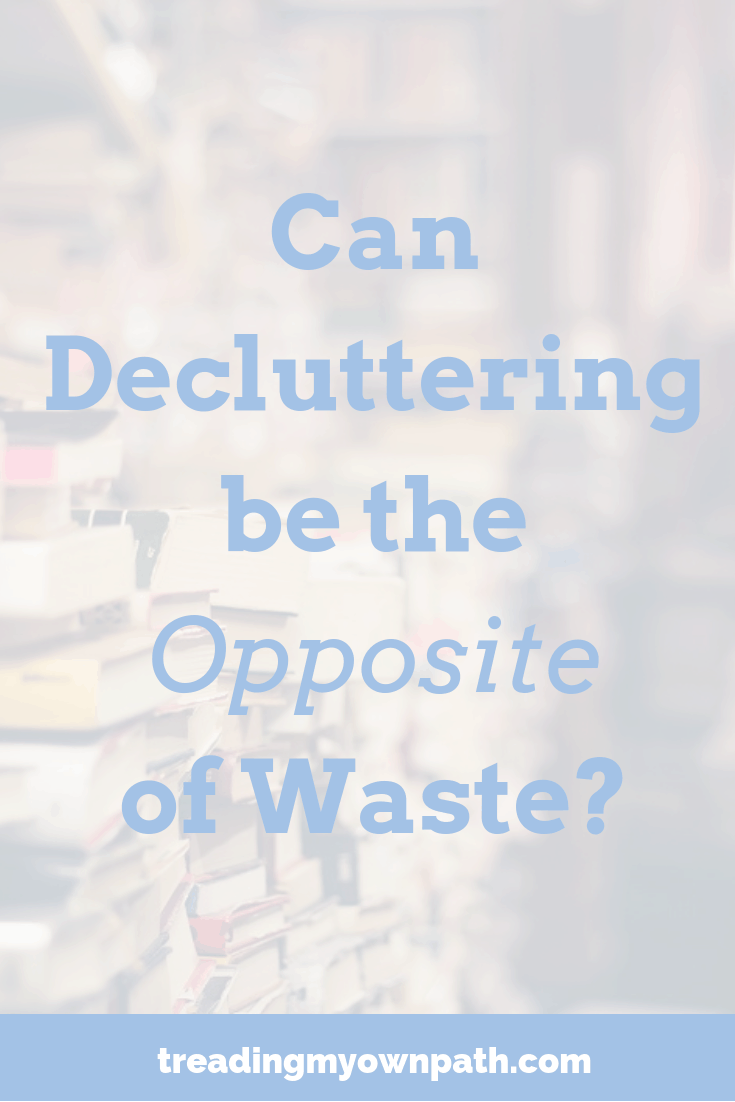Can Decluttering be the Opposite of Waste?
For the longest time, I thought that decluttering and zero waste were opposites. Didn’t decluttering mean chucking decent stuff away, and zero waste mean throwing nothing away and hoarding it all?
I couldn’t imagine that the two could work together, yet decluttering has been an important part of my zero waste journey. I’ve come to learn that decluttering and zero waste living are not opposites at all. Decluttering can be just as much about wasting less. If you want to live zero waste, don’t write off decluttering.
Here are five reasons why decluttering is a valuable part of living with less waste.
Decluttering doesn’t mean sending to landfill (or dumping at the charity shop).
When it comes to getting rid of unwanted items, the two most commonly cited options are discard or donate. Discarding really should be a last resort, saved only for those things that are damaged beyond repair, non-recyclable, and possibly dangerous. But what about donating?
Charity shops want goods that are clean, in working order and desirable.They need to be able to sell them! (Charity shops are not places to take soiled, damaged or dubious goods simply because we can’t bear the guilt of throwing them away ourselves.)
But charity shops aren’t the solution for everything, and they don’t have limitless storage. Taking our winter wardrobes in the height of summer will likely mean good quality items end up unsold simply because there isn’t the demand, and offloading things in the week after Christmas when the rest of the country is doing the same thing probably won’t be much help, either. Not all charity shops can accept electrical items.
If you really care about waste, you don’t need to ‘hope’ that the charity shop will on-sell your stuff. You can take matters into your own hands. Finding new owners for the things you want to declutter is the best way to ensure they stay out of landfill.
Before donating, call the charity shop and ask if there are things that they need (and also things that they don’t). There will always be things in high demand and things that aren’t.
Don’t limit your donating to the charity shops. Women’s refuges, charities and animal sanctuaries are other places that accept donations. Schools, clubs, community groups, crafting societies and charities all have needs and might be able to help take unwanted items. Online classified sites like Gumtree are a great way to find new owners for unwanted goods, and a way to offer broken goods for parts and spares.
Decluttering is a way to maximize the use of something.
This sounds counter-intuitive – how is giving something away going to maximize its use? This depends on whether we actually use the things in question. Owning stuff we don’t need, don’t use and don’t like is a complete waste.
There are two main reasons we keep things we don’t need: just in case (fear of the future), or guilt (regret for the past).
We might need it in the future. That is true. But if we haven’t needed it so far, what are the chances? Could we get a replacement quickly, affordably and second-hand? This will depend on individual circumstances, but in most cases, there is no need to keep something just in case.
There will be someone out there looking for that item, who will use it today.
We might feel guilty. There are many reasons that we feel guilt: we made a poor choice, spent too much money, didn’t lose the weight we’ hoped, dislike the handmade gift that we know took so much effort and time. Keeping something out of guilt does not increase the chances that we will use it.
Keeping an unwanted item and thinking that we somehow alleviate the guilt won’t work. The best way to ease the guilt is to let the item go.
We sometimes try to justify keeping things that that we don’t use rather than giving them away by telling ourselves that we are reducing waste. Actually, the opposite is true. Owning something that you never use is the biggest waste of all. It is far better to give these things to people who truly need them and will use them every day.
Decluttering as an end, not a means.
Decluttering is about removing the unnecessary, the unused and the unwanted from our homes. It’s about removing the excess, and keeping only the things we find useful and beautiful. If our homes are filled with items we use regularly and appreciate, there is little or no waste.
Yet decluttering will only reduce waste if it’s treated as a one-way process, rather than a means. If the purpose of decluttering is simply to make room in the house for a big shopping spree where the old stuff is replaced with a bunch of new stuff, clearly that is going to generate a whole heap of waste.
Until the cycle of consumption is broken, and needless things are no longer brought into the home, decluttering can never mean less waste.
Decluttering helps conserve resources.
Have you ever tried to buy something second-hand, and not been able to find it? Sometimes we need things, and we want to purchase them second-hand, yet that isn’t an option. If we really need that item, we’ll probably have to go and buy it new.
Yet somewhere, there would have been an unwanted, second-hand option that would have been perfect.
Rather than keeping things to ourselves, we should embrace the opportunity to share what we have. There are so many resources tied up in cupboards, wardrobes, playrooms, shed, garages and attics around the world in the form of unused stuff.
Decluttering frees up these resources so others can use them. Donating items we don’t need gives somebody else the opportunity to use them, and helps prevent new purchases.
Decluttering helps form new habits.
I have always found decluttering hard. I found it hard because I was forced to confront my poor decisions (impulse purchases, wasted money, non-repairable items), and my failure to achieve what I’d hoped (hobbies that never got off the ground, clothes I never slimmed into).
I know I’m not alone in this.
We’ve all made choices that we regret, and we’ve all purchased things that in hindsight, we wouldn’t purchase again. Because I struggled so much with decluttering, I now think much more carefully about what I bring into my home. It forced me to examine my old habits, and think about the decisions I had made in the past.
As a result, I now make better choices. Can the item be mended? Can it be recycled? Is it built to last? Do I have a real, genuine need to own it? Is there a second-hand market for it?
I can appreciate well-made clothes, or admire chic decor or clever design, but that doesn’t mean that I need to make a purchase.
There will always be beautiful things. If I don’t need it, or can’t see how I will dispose of it responsibly, then I don’t buy it.
Now I’d love to hear from you! Are you living or working towards a zero waste lifestyle, and how do you feel about decluttering? Is it something you’ve struggled with or something you’ve embraced? Have your views changed over time? What have you struggled to declutter? What are the reasons that held you back? What are your success stories? Are you a master declutterer? What are your tips for ensuring your items find good homes? What unconventional places have you found that will accept your unwanted items? Anything else you’d like to add? Please tell me your thoughts in the comments below!
[leadpages_leadbox leadbox_id=1429a0746639c5] [/leadpages_leadbox]







Great post Lindsay!
I love the idea of admiring beauty without having to own it. We are just swamped with marketing that tells us that beauty, confidence and status can be bought in the form of a vehicle, appliance, knick knack or cosmetic product. Taking a step back to admire how stuff is designed or how it makes us feel, without needing to own it has been an important step in my journey. I still like browsing markets and thrift stalls, but buy a whole lot less. In some ways it makes the world a more beautiful place when you can admire things without feeling that longing to own them.
Thanks Kerry! For me too, realising this was quite important in detaching myself from the marketing tricks/consumer treadmill. Now with the internet and social media, we see so much stuff we can appreciate, and trying to own it all (or do it all, or make it all, or eat it all) is never going to happen. Appreciating without buying is very liberating! And I agree, rather than feeling sad / miserable (because you want something and can’t afford it / have no room) it makes me feel happier, actually!
I like to ask myself if the item is fulfilling its purpose at my home. Put the item at the centre, not me. If I don’t use or wear something or if decorative items don’t remind me of something and make me smile, they are not meeting their purpose (for me) and are better off with someone else.
That’s a great way to think about stuff, Mel! “Is this item fulfilling its purpose?” Yes, that is exactly it! If the answer is no, then it is going to waste. Thanks for this!
Oh, decluttering! It’s changed my life. It took me a year to complete the process, but now I’m dedicated to being tidy and not accumulating clutter in the future. In fact, my last two blog posts were on this hot topic :)
I agree completely Andrea! For me it was a long and difficult process, but now I have less stuff I feel less stressed and I’ve lost all the guilt / resentment that my unused stuff used to give me. I’ve just had a read of your last blog post – love it! : )
Thanks for the reminder that charity shops do not necessarily want all of our cast offs, especially out of season clothes and off loading stuff after Christmas. It’s easy to see these stores as a dumping ground and I can see that this is really disrespectful of the great role that they play in our lives. I really like your idea of actually asking them what they need. I am slowly decluttering, with gifts from family members being the hardest items to shed.
There’s a charity shop near where we used to live and it has this covered shed around the back where you can drop off unwanted items. We moved out on 24th December last year, and we took a bagful of stuff there, and the shed was full to bursting. And some people had “donated” stuff that was clearly only suitable for the bin – broken, soiled, etc. But what really got me was that behind the gate there were bales and bales of donations – I’m talking 2m by 2m bales (maybe bigger), of shoes and clothes and other stuff. Maybe there were 10 of them. And I thought to myself – who are we kidding that we’re doing these guys a favour donating our stuff? They really don’t need any more! Of course, charity shops want good donations but they receive far more than they can sell. We need to do what we can to ensure they get the best ,most useful stuff.
Gifts can be hard to donate. But remember, the act of love was in the giving, not the actual gift. Most people don’t remember what they’ve given and won’t notice if stuff is gone. Think of it the other way – would you rather your friend/family member hung onto something they hated/never used simply because you’d bought it for them (probably feeling guilty that they didn’t like it/use it every time they saw it), or would you rather they donated it and got something they did like?
My family know I sell or donate things I don’t like. I think it makes them much more reluctant to buy me things… and this is a good thing! They have embraced the idea of experiences instead so we have nice meals together and do fun stuff, rather than the whole awkward present thing. It’s worked out really well – for all of us I think!
Hope that helps! Good luck with the decluttering : )
freecycle.org is a great place for getting rid of things you don’t need and it’s nice to know it’s going to someone who needed exactly that thing!
Great reminder Louise! I’ve used Freecycle in the past and found the community to be very helpful, and they always come to collect when they say they will (in my experience). It feels so good knowing that your unwanted stuff is going to someone who really wants it!
I’ve recently discovered a whole bunch of facebook sites where I can either give away or sell items I no longer want and it has been a Godsend! You post a photo, describe what you’re wanting to re-home and people reply, sometimes within minutes! They then come and pick up. Messages about pick up are sent via private messaging. There’s no excuse for hanging on to something you’d rather not have.
That’s so great Frances! My upstairs neighbour uses a barter Facebook group and loves it (it’s kinda like a free swap site but with random exchanges I think). I haven’t used them much but I have heard so many good things. Glad to hear you’ve had great success. Social media and the internet has definitely made it easier to connect useful stuff with people who actually want it! : )
Thanks for some very good suggestions – I like the women’s refuge option best for donating gently used clothes. Seems like the Goodwill-type shops jumble things up so much that its hard to imagine they’ll really get to someone who needs them. Right now I’m looking for somewhere to donate some “rag-bags” — old cotton fabric that will be recycled or used for things like rag paper. No luck yet but not giving up.
Thanks Sandy! I find Goodwill shops very hard to browse – in Australia they have this strange habit of arranging clothes by colour rather than size! Which means unless I know I need something specific (a black top) I have to rummage through every single rail – and I don’t have the time (or the patience).
Some charity shops will accept clothes for rags – check with them, and make sure if you donate them that you clearly label them “rags”. It’s usually the bigger/national stores. I don’t know if you have H&M clothes store near you, but they accept old clothing for “recycling” – I don’t know what “recycling” means in their eyes but it’s another option.
This the mot well thought out write up on decluttering I have ever read – thank you for the emphasis and paradigm shift
Thank you very much Mr Home Maker! : )
Doesn’t stop me buying and accumulating records & CDs. I love music, but I have a lot of it. I like to buy the physical item to support the artist, and the people who do the artwork, but it does result in a big collection!